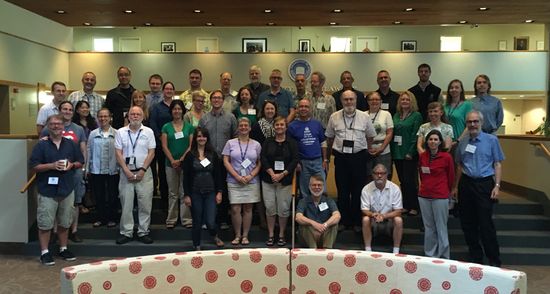Digitizing the 2nd largest Invertebrate Phylum: Mollusks
Mollusks are the 2nd most species rich invertebrate phylum on the planet. In the US there are approximately 55 reported mollusks collections housed in a great diversity of small, midsized, and large collections. However, there are numerous smaller, heretofore largely unknown ‘shell’ collections containing North American specimens in various museums that are not known to the research and environmental research communities. This proposed taxon focus digitization workshop will assemble a solid data foundation on the current status of US mollusk collections digitization, develop advancement strategies for rapidly promoting digitization and mobilization of North American molluscan specimen data, and provide georeferencing training covering key issues in terrestrial, aquatic, and marine localities, with special relevance to the phylum. The research use of digitized mollusk data and various applications by other stakeholder forms a prominent component of this workshop. The workshop will last 1.5 days and will be conducted in connection with the Annual Meeting of the American Malacological Society in July 2017 hosted by the Delaware Museum of Natural History in Wilmington, DE.
General Information
Dates: July 16-17, 2017
Location: University of Delaware
Workshop Facilitators: Petra Sierwald and Liz Shea
Live Broadcast
http://idigbio.adobeconnect.com/mollusks/
Logistics
Breakout Group Reports
- 1. Digitizing by preparation type
- 2. Data entry, workflow
- 3. Adding new data to old records
- 4.Data Quality Assurance/Quality Control (QA/QC)
- 5. Collaboration, dissemination, feedback
Group Notes
Workshop Recordings
- Day1 8:30-10:30am
- Day1 11am-12:10pm
- Breakout Group Report Backs
- Day1 Discussion: How can we standardize and find efficiencies?
Collection Posters
- Museum national d'Histoire naturelle
- American Museum of Natural History
- Scripps Institution of Oceanography
- Bailey-Matthews National Shell Museum
- Buffalo Museum of Science
- Burke Museum of Natural History and Culture
- Canadian Museum of Nature
- Florida Museum of Natural History
- Illinois Natural History Survey
- Santa Barbara Museum of Natural History
- The Schiele Museum of Natural History
- Field Museum of Natural History
- University of California Museum of Paleontology
- University of Michigan Mueum of Zoology
- Carnegie Museum of Natural History
- National Museum of Natural History
- Museum of Comparative Zoology
- Milwauke Public Museum
- Delaware Museum of Natural History
- Natural History Museum of Los Angeles County
- Academy of Natural Sciences
- Paleontological Research Institution
- North Carolina Museum of Natural Sciences
Presentations
- Introduction to the Mollusk Digitization Workshop
- Collaborative Georeferencing Experiences: FishNet2 and SERNEC (Nelson Rios)
- GBIF Task Force Survey of Mollusk Collections (Deb Paul)
- Fundamentals of georeferencing using GEOLocate (Nelson Rios)
- Introduction to iDigBio & weDigBio (Deb Paul)
- Introduction to Symbiota InvertEBase Portal for Mollusks: data entry plus dissemination (Shea)
- Status of our collections with survey results (Bieler)
